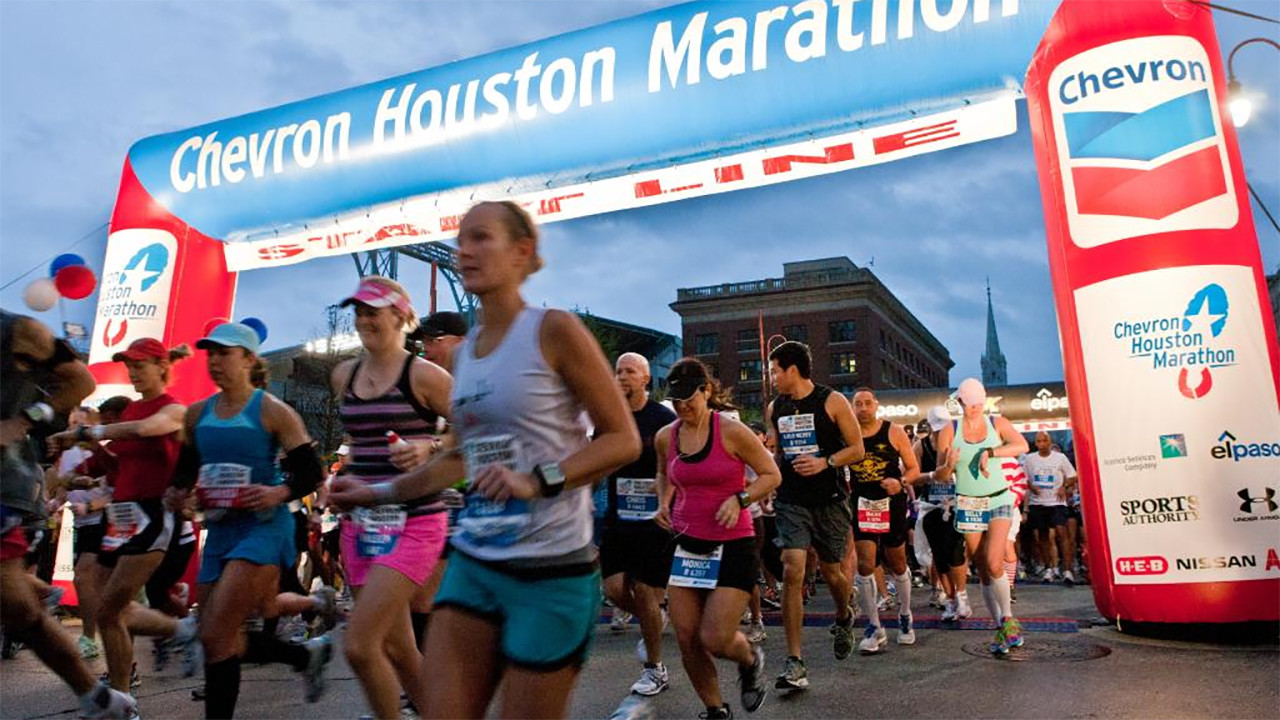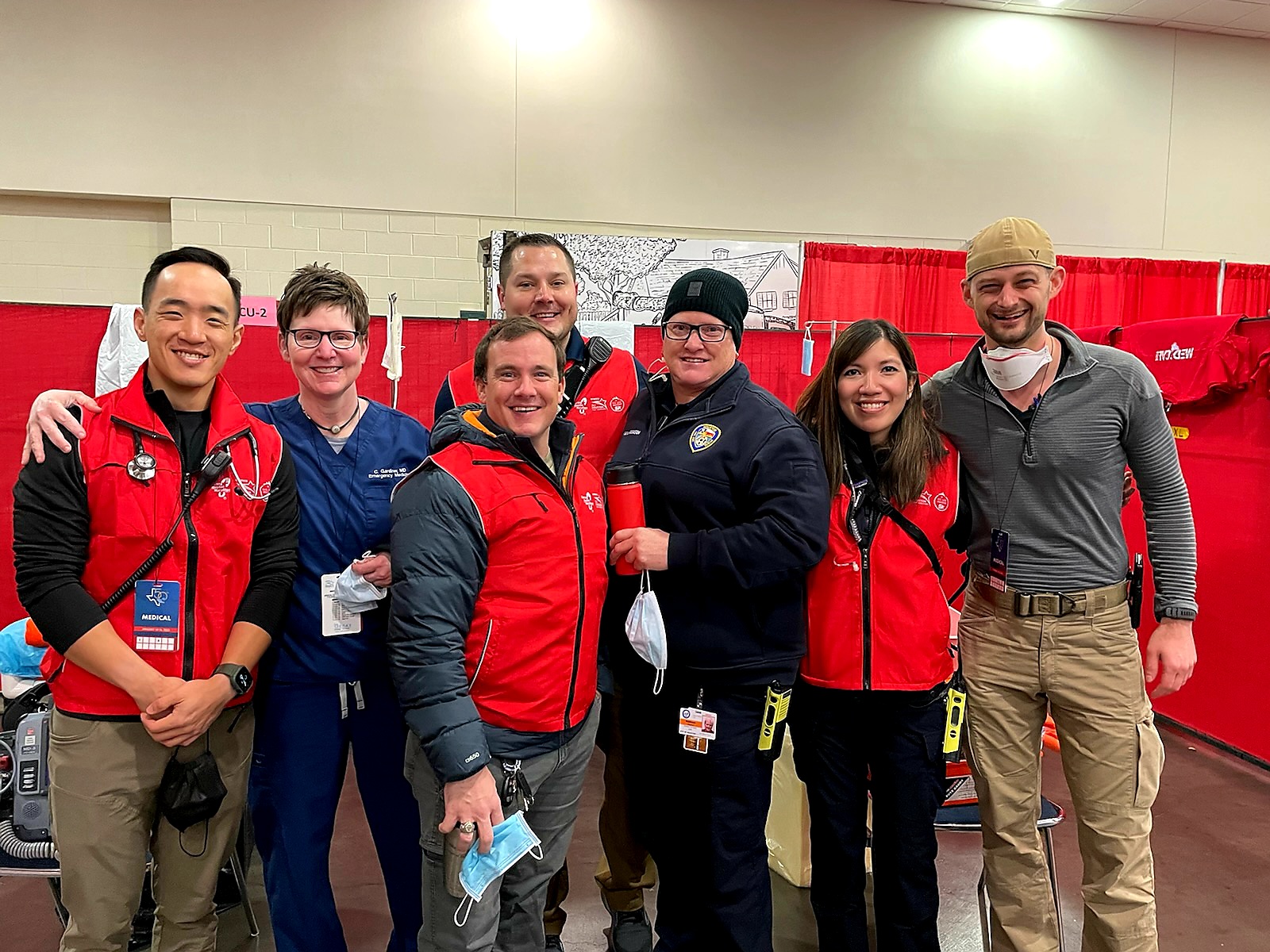A Test of Endurance – Dr. Gill’s Victory Lap as Houston Marathon Medical Director


On Sunday, January 16, the streets of Houston were flooded with runners from across the state of Texas returning for the 2022 Chevron Houston Marathon.
As participants weathered the frigid morning for the 26.2-mile trek, the Department of Emergency Medicine prepared for their own test of endurance. Assistant Professor of Emergency Medicine, Joseph P. Gill, MD assumed duties for the marathon as an Associate Medical Director.
“This year brought us a great opportunity to transition from last year’s virtual event back to an in-person race for the 50th anniversary of the Houston Marathon,” said Dr. Gill.
As Harris County raised its COVID-19 threat level to red, Dr. Gill worked closely with Lars Thestrup, MD, Medical Director of the Houston Marathon Committee to address public safety protocols and streamlined processes for the mass attendance.
“Obviously the marathon is an outdoor event and we know that the transmission of COVID outdoors is very low, so we are fortunate in that aspect. We figured the COVID-19 threat level was going to go to red based on what we were seeing prior to the marathon. We have checked in with our hospitals to make sure they have the capacity in the event of possible transports and a small influx of patients prior to the race,” assured Dr. Thestrup. “We have been in close contact with the city of Houston, the Mayor’s office, our sponsors, the health department, and health authorities on a daily basis to streamline our safety procedures.”
Dr. Gill and Dr. Thestrup along with multiple UT physicians and staff oversaw the field hospital inside the George R. Brown Convention Center. COVID-19 countermeasures included spacing out vendors and adding a corral at the marathon starting line to promote social distancing. Indoor vendors were limited to a small number, while post-race services were reconfigured to encourage movement through the conference area. Face coverings were provided for runners pre and post-marathon, and the usage of gloves and N95 masks were enforced at indoor venues, field aid, clinical areas, and refueling stations. To limit potential exposure of runners that ate after the marathon, the RunFest celebration area was moved outside with socially distanced tables. The George R. Brown Convention Center also included an emergency room consisting of physicians, nurses, massage therapists, and podiatrists volunteering from local hospitals and utilizing the same level of PPE when working clinically.
“Dr. Lars Thestrup and I worked diligently to ensure the well-being of all runners and staff. The year-long planning and numerous precautions allowed a safe race for over 18,500 runners. Marathon medical staff treated hundreds of runners throughout the race, preventing any increase in strain on our local healthcare systems. I am extremely proud of our volunteers who continued to make this race one of the best despite challenging times,” said Dr. Gill.
“In his first year as the Associate Medical Director for the race, Joe really knocked it out of the park, and we’re all extremely proud of the job he’s done,“ said Section Chief of Prehospital and Disaster Medicine, Kevin Schulz, MD, FAEMS, FACEP “Dr. Gill and Dr. Thestrup did a phenomenal job, along with a number of Department of Emergency Medicine faculty, fellows, and residents who participated. Emergency Medicine providers are a great fit for event and race medicine, and volunteers from our Department took on leadership roles, provided compassionate care to the many athletes they encountered, and represented McGovern and the Department of Emergency Medicine extremely well.”

Left to right: Dr. Joshua Fan, Dr. Carolyn Gardiner, Dr. Hutch Stilgenbauer, Dr. Joseph Gill, Dr. Heather Robinson, Dr. Katherine Luu, Dr. Brad Egbers
Through concentrated efforts, more than 18,500 runners successfully competed, 200 patients were treated and only 6 runners were transported to local hospitals for injuries. Additional Emergency Medicine faculty, staff, residents, and EMS fellows that volunteered include Carolyn Gardiner, MD, Assistant Professor for Department of Emergency Medicine, Joshua Fan, MD, 2022 Department of Emergency Medicine Resident, Whitney Chandler, DO, 2022 Department of Emergency Medicine Resident, Miles Maassen, DO, 2022 Department of Emergency Medicine Resident, Hutch Stilgenbauer, MD, EMS Fellow, Katherine Luu, MD, EMS Fellow, Heather Robinson, MD, EMS Fellowship Associate Program Director, Kevin Schulz, MD, EMS Fellowship Program Director at McGovern Medical School at UTHealth, Brad Egbers, MD, 2021 Department of Emergency Medicine Resident Alumni, and Al Lulla, MD, Assistant Professor for Department of Emergency Medicine.